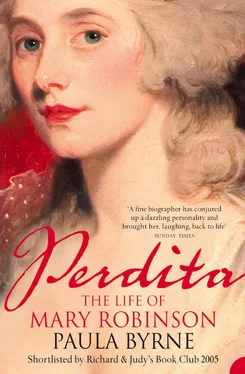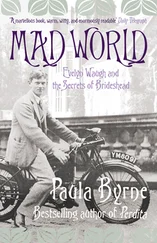Despite his sordid profession as a moneylender, King had a reputation as a man of culture. John Taylor, an oculist who moved in the very best circles and who was himself a poet and a friend of Mary Robinson, recorded in his memoirs that he had known King for forty years and always found him honourable, hospitable, and attentive, and that he especially liked having men and women of talent at his table. 10
Mary’s letter accords with this image: King is presented as a companion for theatregoing and literary talk, associated with poetry and the language of sensibility. The reference to her own efforts at poetry suggests that, with her stage debut forestalled by her marriage, she is already thinking of a literary career. Robinson, meanwhile, is anything but a sensitive literary man: he is a ‘stupid Thing’ and Mary effectively admits that she only married him because of his supposed financial prospects. Because of his deception on this front, he has forfeited any right to strict conjugal loyalty.
For King, this was sufficient encouragement. His reply brings him to a pitch of excitement:
I will not think you sincere, when you say you love; yet if you are not in earnest, you have given too serious a Testimony of it for one only in Joke ; but it is almost Blasphemy to suspect one of such heavenly Form, so beautiful, such Symmetry of Features, such delicate welformed [sic] Limbs, such panting snowy Breasts, such – Oh! What Raptures ineffable seize my delighted Imagination , when I recollect the delirious Transports that throbbed to my very Soul, when that beauteous Form stood confessed in all the resistless Power of – Nakedness . I must stop till my enraptured Fancy returns from the ecstatick Thought.
Is this a ripe fantasy or had he really caught a glimpse of a naked Mary in Oxford or on some other occasion?
With the flirtation getting this far out of hand, Mary cooled the temperature in her following letter – though she still needed to keep King sweet, because she was, as she put it in a postscript, ‘rather short’. The correspondence had by now lasted for a month. On 1 November, King wrote with further references to ‘the mystick Meaning of thy wanton Love’ and his ‘ melting Senses ’ drowning in ‘ delicious Transports’, while at the same time delivering a rebuke: ‘You little Prodigal, you have spent £200 in Six Weeks: I will not answer your Drafts.’ King’s refusal to forward any more funds, despite a further request, brought the correspondence to an abrupt end in the final week of November. Mary’s last letter is in a very different tone from the preceding ones:
I Find you have not yet answered my Draft. I do not wish an Acquaintance with any Man who professes so much Love, but who gives so little Proof of it. I wish I could recall those imprudent Moments when I suffered your deluding Promises, and seductive Tongue, to betray me into Sin; but unless you give me the Token of your Sincerity that I ask for, I will take care how I trust you again. I am astonished that you should scruple to lend me such a Sum as £100 when it was the last I should borrow, and should have repaid it faithfully. Now you have an Opportunity of shewing your Love, or I shall see that you have all along deceived me.
King responded with a long and vitriolic letter on the evils of ambition and avarice, and the correspondence ended. His failure to recover either his original loan or his subsequent advances, together with a not unjustifiable sense of having been taken for a ride by Mary’s flirtatious manner, accounts for his action in publishing the letters in 1781. There is no evidence that King himself had any further dealings with Mary thereafter, though by a curious twist his daughter became a passionate fan of her poetry. *
Late in November, Robinson returned to Bristol to fetch his wife. They left Hester and headed across to Wales. They endured a hazardous crossing at Chepstow in an open boat in the midst of a fierce storm. In the Memoirs , Mary novelistically interprets this as an ill omen, akin to the storm that coincided with her birth. Throughout the journey Robinson tried to prepare his refined young wife for her first meeting with his family. Still denying that Harris was his father, he asked Mary to ‘overlook anything harsh that might appear in the manners of his uncle ’. But she was busy absorbing the beauties of the landscape as they drove into the remote Welsh countryside: ‘We passed through a thick wood, the mountains at every brake meeting our eyes covered with thin clouds, and rising in a sublime altitude above the valley. A more romantic space of scenery never met the human eye!’ 11
With a shift of tone typical of Mary’s mercurial nature, the narrative of her visit to the in-laws then turns from romantic novel to comedy of high and low life, with the sophisticated townies meeting the country bumpkins. Mary was fabulously dressed, as usual, in a dark claret riding habit and a white beaver hat trimmed with feathers. She looked askance at the odd couple that waited to greet her, her father-in-law, Thomas Harris, and his daughter, Elizabeth. Harris, evidently pleased with the elegant Mrs Robinson, kissed her ‘with excessive cordiality’, while his daughter led her into the house ‘with cold formality’. ‘She could not have taken my hand with a more frigid demeanour,’ Mary adds, clearly relishing the memory. 12
The young women sized one another up. Elizabeth was not a great beauty and must have felt threatened by her brother’s fashionable wife. She was cold and haughty and took an instant dislike to her new sister-in-law. To Mary’s sharp eyes, she looked a fright. Elizabeth seemed older than her twenty years, moved stiffly, without grace or elegance, and was short and clumsy looking. She had a rustic face with a snub, upturned nose, and cheeks ‘somewhat more ruddy than was consistent with even good health’. 13 Her countenance, Mary thought, was ‘peculiarly formed for the expression of sarcastic vulgarity’. The elegantly dressed Mrs Robinson was equally appalled by Elizabeth’s vulgar attire; she wore a cheap gaudy chintz gown and a ‘thrice-bordered cap’ decked with a profusion of ribbons. Her initial impression of retired tailor Thomas Harris was just as dismaying: he wore an unfashionable brown fustian coat, a scarlet waistcoat trimmed with gold, a gold-laced hat, and – instead of the silk stockings that befitted a gentleman – a hideous pair of woollen ‘spatter-dashes’. He cuts an engagingly comic figure, his manners coarse and boorish, but kind of heart – the very embodiment of Squire Western in Fielding’s Tom Jones or Goldsmith’s Mr Hardcastle in She Stoops to Conquer .
Harris was, in fact, an influential figure in Glamorganshire. He was the squire of two large estates, Tregunter and Trevecca, and was a Justice of the Peace. One of his brothers was Howel Harris, a well-known Methodist reformer. Possibly through his brother’s influence, the religious reformer Selina Hastings, Countess of Huntingdon, had established a seminary at Trevecca House for the training of ministers. Elizabeth Robinson was a convert to Lady Huntingdon’s ‘sect’, and sometimes took Mary with her to Trevecca. Squire Harris preferred the local church where he could throw his weight around and fine the rustics for swearing, even though ‘every third sentence he uttered was attended by an oath that made his hearers shudder’. 14 Harris spent most of the days on his estate, riding his small Welsh pony, only appearing at meal times.
Mary was thoroughly bored by her husband’s family. She quickly discovered that the real ruler of the household was Molly Edwards, the housekeeper. She heartily disliked her: ‘a more overbearing, vindictive spirit never inhabited the heart of mortal than that which pervaded the soul of the ill-natured Mrs Molly’. 15 Miss Betsy and Mrs Molly were jealous of Mary, who supped ale with the squire and soon became his favourite: ‘They observed me with jealous eyes; they considered me as an interloper, whose manners attracted Mr Harris’s esteem, and who was likely to diminish their divided influence in the family.’ 16
Читать дальше












